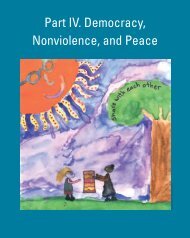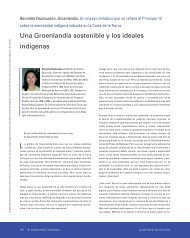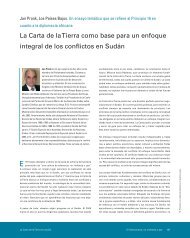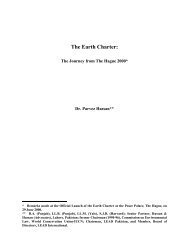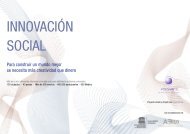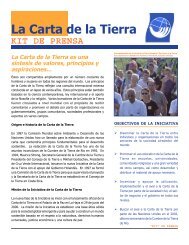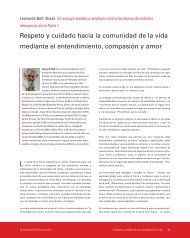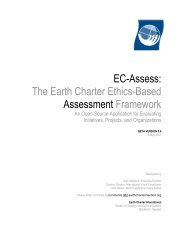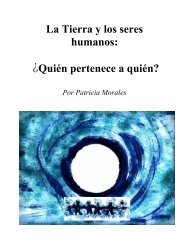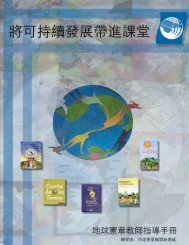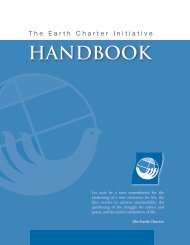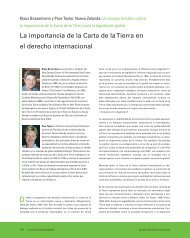COUNCIL - Earth Charter Initiative
COUNCIL - Earth Charter Initiative
COUNCIL - Earth Charter Initiative
You also want an ePaper? Increase the reach of your titles
YUMPU automatically turns print PDFs into web optimized ePapers that Google loves.
XVIII. Supplementary Historical Information<br />
Text of UNESCO Resolution Formally Recognizing the <strong>Earth</strong> <strong>Charter</strong><br />
UNESCO RESOLUTION ADOPTED AT<br />
General Conference PLENARY SESSION<br />
16 October 2003<br />
Item 5.23 – UNESCO’s support for the <strong>Earth</strong> <strong>Charter</strong><br />
31. The Commission III recommends to the General Conference that it adopt, for the records of the<br />
General Conference, the draft resolution 32 C/COM.III/DR.1 (submitted by Jordan, supported by Costa<br />
Rica) as amended orally by Jordan. The resolution reads as follows:<br />
The General Conference, Considering that:<br />
– Over the decade of the 1990s, there has been a worldwide, multicultural, multisectoral consultation<br />
process for the creation of an instrument that contains the shared values, principles and ethics that can<br />
guide our efforts towards a sustainable future,<br />
– Today, the international community has the <strong>Earth</strong> <strong>Charter</strong> as an instrument, which contains fundamental<br />
principles for building a just, sustainable and peaceful global society,<br />
– The <strong>Earth</strong> <strong>Charter</strong> sets forth an integrated approach to addressing our interrelated problems the world<br />
community faces. This ethical framework involves respect and responsibility for the community of life,<br />
ecological integrity, social and economic justice and equity, democracy, alleviation of poverty, nonviolence<br />
and peace,<br />
– The <strong>Earth</strong> <strong>Charter</strong> is part of a continuing process generated by the United Nations Brundtland<br />
Commission’s (1987) call for a new code of ethics for sustainable development, and the unfinished issue<br />
of the Rio <strong>Earth</strong> Summit, which attempted adoption of an ethical framework for sustainability, and<br />
– UNESCO is a Task Manager in the United Nations system of Chapters 15 (Science) and 36<br />
(Education) of Agenda 21, 32 C/73 – page 16<br />
Resolves to:<br />
1. Recognize the <strong>Earth</strong> <strong>Charter</strong> as an important ethical framework for sustainable development, and<br />
acknowledge its ethical principles, its objectives and its contents, as an expression that coincides with the<br />
vision that UNESCO has with regard to their new Medium-Term Strategy for 2002-2007;<br />
2. Affirm our intention, as Member States, to utilize the <strong>Earth</strong> <strong>Charter</strong> as an educational instrument,<br />
particularly in the framework of the United Nations Decade for Education for Sustainable Development;<br />
3. Invite the UNESCO General Conference to analyse with the UNESCO Director-General how to<br />
reinforce, in a practical way, the vision and principles of the <strong>Earth</strong> <strong>Charter</strong> in UNESCO programmes.<br />
<strong>Earth</strong> <strong>Charter</strong> <strong>Initiative</strong> [111]<br />
HANDBOOK



